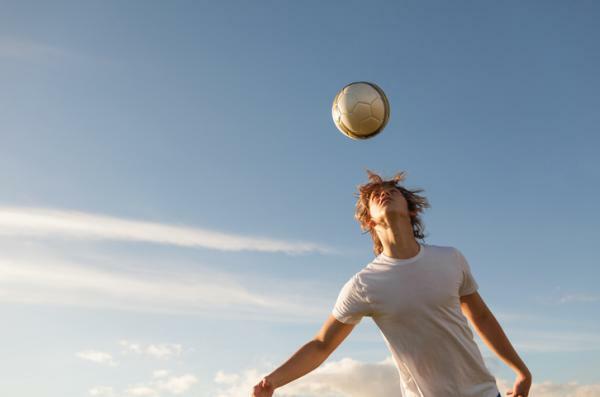
This talk is intended to recall some experiences and raise some questions in a field as attractive as unknown or better little explored, soccer and the Psychology of the sport.
In this PsychologyOnline article, we will present a talk by La Sports Psychology in School and Youth Soccer.
So let's start this talk and I have no doubt that it will be at least interesting and not only for those who feel passion for this wonderful sport (today it has become a wonderful business). but also to lovers and practitioners of Psychology, physical culture and any person with a weakness for deepening issues in relation to human thought and sport.
Index
- The importance of football in our society
- The psychological issue in future athletes
- Prevention for future athletes
- Discussion of a comprehensive program
The importance of Soccer in our society.
Soccer is probably the most beautiful sport, the only one capable of combining ingredients such as
It is the sport chosen by more human beings in the world to play it, go to enjoy it on the courts, follow it on television or simply read it. It is a sport where everyone has an opinion on the game; the people, the journalists, the players and the coaches. Soccer is a sport that has become super-professionalized and as a super-professionalized sport it has become a new product, a new merchandise. It is impossible to believe in this environment that a player fully enjoys the game, that is, to feel satisfaction, playful pleasure; In high competition, pleasure is minimized because excessive pressure in competition produces disruptions of balance and psychological well-being both in football Professional as in school and youth before it was played for honor, for a medal, for the neighborhood today it is played for an institution, for fame, for money or for a transfer To the exterior.
When we talk about school and youth soccer we are talking about a population of adolescents between the ages of 13 and 18 with the same passion and the same objective a motivation but with a different family, personality, different social background and psychological attitude.
The psychological question in future athletes.
According to the contribution of different authors, future athletes feel inclined towards the practice of sport due to:
- Satisfaction with physical activity
- Improve your skills
- Art and expertise in sport
- Travels
- Extrinsic rewards
The future footballer must be an athlete who is characterized by having:
Clarity of objectives.
- Initiative.
- Discipline.
- Decision fortitude.
- Tenacity.
- Security domain of yes.
- Self-direction.
But when working with athletes in the school or youth categories we find a picture totally different, as corroborated by different works carried out in Argentina, Ecuador and Colombia that characterize it with a:
- Low self-esteem.
- Poor communication skills.
- Emotional instability.
- Critical family environment.
- Justifying attitude to failures.
- Difficulties in interpersonal relationships.
- Behavior problems
Before this painting Sports Psychology raises:
- Resolve conflicts (communication, sports coach, public family)
- Youth social development
- Stress management
- Personality development
- Stimulate research
- Philosophy of health and life.
The work of the psychologist as that of the coach, physical trainer and doctor is measured by its effectiveness, in This case is an invisible work, sometimes imperceptible and that does not shine with real effects but over the long term. term. The big two objectives that guide the psychologist's task in this category are:
- Prevention and promotion of mental health of the athlete, framed in the plane of the human being.
- The highest possible performance at the time of competition, that is: potential and mentally train psychological attitudes such as confidence, concentration, motivation, isolation from external and internal pressures, help to bring the group together and improve the relationship coach-player.
When we work in school and youth soccer we must know that the axis is not exclusively set in the results, but in the promotion of the largest possible number of players to the professional division.

Prevention for future athletes.
When developing this task we must prevent:
- School dropout: First, we try to avoid false dichotomies such as do you play or study, play or have a girlfriend, etc. We should instead try to guide him since if he organizes his time well, the young man will be able to train, play, have a girlfriend, etc. In this way you can perform on all levels without losing your interests and motivations. For the majority of adolescents, school is synonymous with having a good time, soccer is instead a short run without taking into account the possible injuries that appear, what to do then in the other 30 years of life. Starting from this, education gives more elements to face life increasingly difficult.
- Expulsions: Soccer is a team game in addition to harming the sent off the expulsion also harms the whole group since it leaves the team in numerical inferiority, this being an aspect that goes unnoticed but it is necessary to take it into account in the different competencies.
- Injuries: Statistics tell us that players who come to a club for the first time are injured more frequently, usually in the first month; There are two fundamental factors: The environmental change and the change of pace in the training demands, the first refers to the physical place (house, hotel, town, city) interpersonal relationships (family, girlfriend, friends, school, etc.) the second factor in most cases the training pace is higher than the used to.
- Stress Inductors: In this division the parents, the girlfriend, the friends in many cases are the inducers of stress, drugs, alcoholism and competitive aggression. As the following sentence shows: "As a young man can play well if every time he makes a mistake, he hears the mother's laments and perceives the father's disappointed face (L. Forti) "
At this stage, the highest number of school and sports dropouts occurs, as demonstrated by Weinberg and Gould (1995) establish that the maximum sport participation occurs between the 10-13 years and that, from this age, they begin to abandon sports practice, placing the rate around 35% in youth age, or what is the same, of every 10 children involved, 3-4 drop out when they are youths
Gould et al. (1982) raise some of the reasons young athletes drop out physical-sports practice:
- I have other things to do.
- It wasn't as good as he thought.
- It wasn't fun enough.
- He wanted to do another sport.
- He couldn't take the pressure.
- It was boring.
- I didn't like the coach.
Other researchers indicate that the reasons why adolescents abandon sports practice are due to the fact that they perceive that their personal goals have not been met. Some reasons that support this argument are: they play for a short time, have little chance of improving their skills, experience stress competitive, there is excessive emphasis on winning, lack of motivation on the part of their family and friends and, consequently, they stop finding it fun. Young people abandon physical-sports activity because they find more fun hobbies or because Their expectations, both inside and outside the school context, have been frustrated (Fox and Biddle, 1988).
Faced with this phenomenon of sports desertion, we propose the following with a view to improve soccer practice school and youth and avoid dropouts:
- Reinforce the effort
- Fewer competitions for rivalry
- Individual instructions.
- Development of self-esteem.
- Success control
- Parent education.
- Develop cooperation and encourage moral reasoning strategies among children in Physical Education classes.
- Improve the training and advice of coaches of school-age children.
- Train and advise the referees.
Discussion of a comprehensive program.
To conclude, we present for discussion a comprehensive training program aimed at Sports Directors, Coaches, Parents and Athletes from this category:
- Health and nutrition.
- Education.
- Training for Life.
- Economic Campaign.
- Soccer Schools Network.
- Interview with parents. Socio-Family Survey.
- Psychopedagogical Training for Trainers.
- Psychological evaluation of soccer players.
- Control of Educational and Sports Behavior. (academic monitoring and counseling).
- Development of Participatory Techniques. Dynamics
- Development of Artistic and Occupational Workshops.
- Participation in Competitions
As a result of this proposal when working with athletes of these categories We have achieved:
- Improve behavior of youth footballers
- The family has taken more awareness of the process
- Coaches acquire greater group dominance
- App workshops improves personal development
This article is merely informative, in Psychology-Online we do not have the power to make a diagnosis or recommend a treatment. We invite you to go to a psychologist to treat your particular case.
If you want to read more articles similar to Sports Psychology in School and Youth Soccer, we recommend that you enter our category of Education and study skills.
Bibliography
- Orlick, T. (1998) About the International Society for mental training and excellence. The Journal of Excellence. Vol. 1. N. 1. May. P.3.
- Martens, R. (1987) Science, knowledge, and Sport psychology. The Sport psychologist, I., 29 55.
- Doubt, J.L. (1982) Future concerns: for applied sport Psychology. Journal of physical education, recreation & dance 53 (9), Nov / Dec,
- MORENO A. & GARCÍA U. (2000) Emotions in sports, editorial loose papers Ibagué.
- ROFFÉ, M. (2000) Pressure football, Psychology applied to sport, Publishing Place Buenos Aires.


